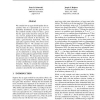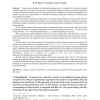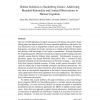107 search results - page 5 / 22 » When Random Play is Optimal Against an Adversary |
UAI
2008
13 years 9 months ago
2008
We consider how an agent should update her uncertainty when it is represented by a set P of probability distributions and the agent observes that a random variable X takes on valu...
ICITS
2009
13 years 5 months ago
2009
In this article, we discuss a naive method of randomness reduction for cryptographic schemes, which replaces the required perfect randomness with output distribution of a computat...
SYNASC
2007
IEEE
14 years 1 months ago
2007
IEEE
A trapdoor based on an extension of the RSA trapdoor is proposed. The same function as in the RSA cryptosystem is used, i.e. x modn, but there is no restriction for the exponent t...
ALGORITHMICA
1999
13 years 7 months ago
1999
Consider an on-line player who needs some equipment (e.g., a computer) for an initially unknown number of periods. At the start of each period it is determined whether the player w...
AI
2010
Springer
13 years 4 months ago
2010
Springer
How do we build algorithms for agent interactions with human adversaries? Stackelberg games are natural models for many important applications that involve human interaction, such...



